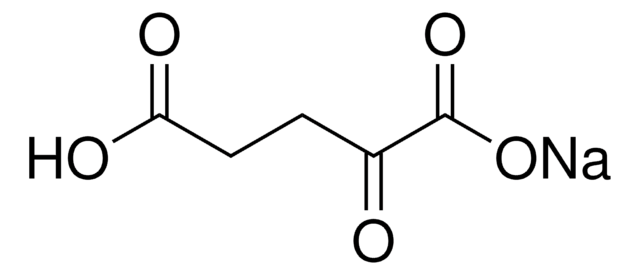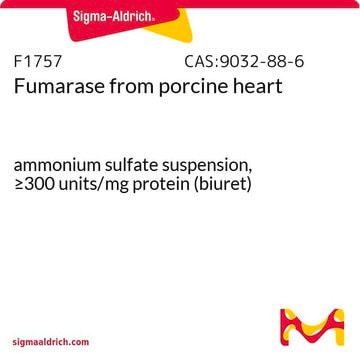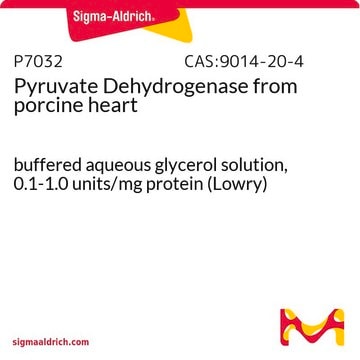K1502
α-Ketoglutarate Dehydrogenase from porcine heart
buffered aqueous glycerol solution, 0.1-1.0 units/mg protein (Lowry)
Sinonimo/i:
Multienzyme 2-oxoglutarate dehydrogenase complex
About This Item
Prodotti consigliati
Forma fisica
buffered aqueous glycerol solution
Attività specifica
0.1-1.0 units/mg protein (Lowry)
Attività estranea
pyruvate dehydrogenase ≤20%
Condizioni di spedizione
dry ice
Temperatura di conservazione
−20°C
Cerchi prodotti simili? Visita Guida al confronto tra prodotti
Descrizione generale
α-Ketoglutarate dehydrogenase (α-KGDH) is a multienzyme complex localized to the mitochondria. This integrated enzyme is made up of many units of thiamine pyrophosphate-dependent dehydrogenase (E1), dihydrolipoamide dehydrogenase (E3), and dihydrolipoamide succinyl transferase (E2).
Applicazioni
- to study the reversal of nitration by glutathione (GSH) in peroxynitrite-treated cells
- to measure its activity by Spectramax M5 microplate spectrofluorimeter using heart mitochondria
- as a positive control to evaluate its activity in by Spectramax GEMINI EM fluorescence microplate reader using mice neurons
Azioni biochim/fisiol
Qualità
Definizione di unità
Stato fisico
Note legali
Indicazioni di pericolo
Consigli di prudenza
Classi di pericolo
Aquatic Chronic 3
Codice della classe di stoccaggio
10 - Combustible liquids
Classe di pericolosità dell'acqua (WGK)
WGK 1
Punto d’infiammabilità (°F)
Not applicable
Punto d’infiammabilità (°C)
Not applicable
Dispositivi di protezione individuale
Eyeshields, Gloves, multi-purpose combination respirator cartridge (US)
Certificati d'analisi (COA)
Cerca il Certificati d'analisi (COA) digitando il numero di lotto/batch corrispondente. I numeri di lotto o di batch sono stampati sull'etichetta dei prodotti dopo la parola ‘Lotto’ o ‘Batch’.
Possiedi già questo prodotto?
I documenti relativi ai prodotti acquistati recentemente sono disponibili nell’Archivio dei documenti.
I clienti hanno visto anche
Il team dei nostri ricercatori vanta grande esperienza in tutte le aree della ricerca quali Life Science, scienza dei materiali, sintesi chimica, cromatografia, discipline analitiche, ecc..
Contatta l'Assistenza Tecnica.











